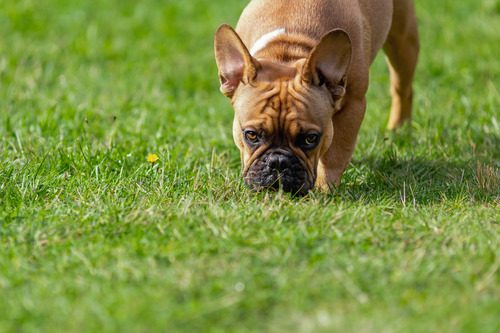Dogs have a unique way of puzzling their owners with their behavior, and one of the most perplexing habits is eating grass. While some pet owners worry that this might be a sign of illness, others shrug it off as a quirky canine trait. So, why do dogs eat grass? Learning about the potential reasons behind this behavior can help you care for your dog more effectively and know when it’s time to seek professional advice. If you’ve ever wondered why your dog munches on grass during walks or in the backyard, this blog covers the potential causes, what it might mean for your pet’s health, and when to reach out to your veterinarian. Let’s dive into the possible explanations for this behavior.

Dogs Eating Grass: Is It Normal?
Many dogs occasionally eat grass, and in most cases, it’s completely normal. Studies show that grass-eating is a common behavior among dogs of all breeds and ages. While it might seem odd to humans, for dogs, it can serve various purposes. Here are some of the most common reasons why dogs eat grass:
- Instinctual Behavior: Eating grass might be a natural instinct for dogs. Canines are descendants of wild animals, like wolves, who consumed plant matter as part of their diet. Grass eating may be a remnant of this ancestral behavior.
- Dietary Deficiency: Some experts believe that dogs might eat grass to compensate for a lack of certain nutrients, such as fiber, in their diet. While commercial dog foods are typically formulated to be nutritionally complete, individual dogs may still crave additional fiber.
- Curiosity or Boredom: Grass-eating can also be a sign that your dog is curious about their environment or simply bored. Dogs explore the world with their mouths, and munching on grass may be part of their exploratory behavior.
- Upset Stomach: It’s a common belief that dogs eat grass to induce vomiting when they feel nauseous. While this hasn’t been conclusively proven, some dogs do vomit after eating grass, which might relieve an upset stomach.
- Taste or Texture: Believe it or not, some dogs might simply enjoy the taste or texture of grass. The crunchiness or freshness of grass can appeal to dogs just as some human foods have unique sensory appeal.
Should You Be Concerned if Your Dog Eats Grass?
In most cases, eating grass is harmless. However, there are situations where it might signal an underlying issue. Here are a few factors to consider:
- Frequency of Grass Eating: If your dog occasionally nibbles on grass, it’s usually nothing to worry about. However, frequent or obsessive grass-eating might warrant closer observation or a discussion with your veterinarian.
- Presence of Vomiting: If your dog eats grass and vomits occasionally but seems fine afterward, it might not be a cause for alarm. However, if vomiting becomes frequent or is accompanied by other symptoms like lethargy or loss of appetite, contact your veterinarian.
- Type of Grass Consumed: Be mindful of where your dog is eating grass. Grass treated with pesticides, herbicides, or fertilizers can be toxic to pets. Always ensure your dog’s environment is safe and chemical-free.
- Underlying Medical Conditions: Persistent grass-eating may be linked to gastrointestinal issues, dietary deficiencies, or even anxiety. A veterinarian can rule out any medical concerns and recommend solutions if necessary.
Potential Health Risks of Grass Eating
Although eating grass is generally safe, there are a few risks to be aware of. Lawns treated with chemicals pose a serious risk to dogs. Ingesting these substances can lead to poisoning, with symptoms ranging from vomiting and diarrhea to more severe health issues. While rare, long strands of grass or plant material can occasionally get caught in a dog’s digestive tract, leading to blockages which require immediate veterinary attention. Grass can also sometimes harbor parasites like roundworms, which can be ingested when your dog eats grass.
How to Address Grass-Eating in Dogs
If your dog eats grass occasionally and seems healthy, you likely don’t need to intervene. However, if you’re concerned about this behavior, here are some steps you can take:
Assess Their Diet
Make sure your dog’s diet provides all the nutrients they need. If you suspect your dog might lack fiber or other nutrients, consult your veterinarian about adjusting their diet or adding supplements.
Provide Mental Stimulation
If boredom or curiosity is driving your dog to eat grass, increasing their mental and physical activity can help. Provide interactive toys, engage in training sessions, or extend their daily walks to keep them engaged.
Monitor Their Health
Pay attention to your dog’s overall health and behavior. If they exhibit additional symptoms like vomiting, diarrhea, or changes in appetite, schedule a visit with your veterinarian.
Is It Time to Contact Your Veterinarian?
While grass-eating is often harmless, certain situations call for professional evaluation. Contact your veterinarian if:
- Your dog eats grass excessively or compulsively.
- They vomit frequently after eating grass.
- Grass consumption is accompanied by other symptoms like lethargy, weight loss, or changes in appetite.
- You’re unsure whether their diet meets their nutritional needs.
At Country Club Animal Hospital, our experienced veterinary team can help you determine whether your dog’s grass-eating habit is normal or requires intervention. Call us at (305) 663-3300 to schedule an appointment or book an appointment online for personalized guidance.
Helping Your Dog Thrive with Healthy Habits
While your dog eating grass is often a harmless quirk, being attentive to your pet’s health and environment is key to ensuring their safety and happiness. Regular check-ups, a balanced diet, and plenty of mental stimulation are simple ways to support your dog in living a happy, healthy life. If you have concerns about your dog’s grass-eating habits or any other behavior, don’t hesitate to reach out to Country Club Animal Hospital at (305) 663-3300 or book an appointment online. Our team is here to support you and your dog with expert care tailored to their unique needs.
